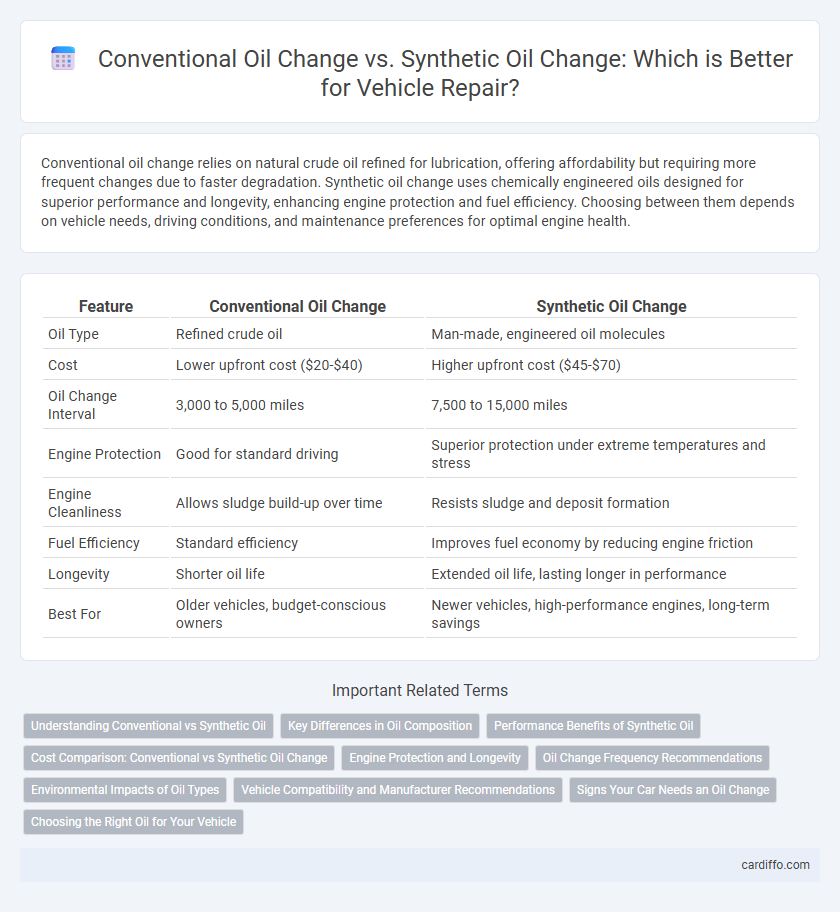Conventional oil change relies on natural crude oil refined for lubrication, offering affordability but requiring more frequent changes due to faster degradation. Synthetic oil change uses chemically engineered oils designed for superior performance and longevity, enhancing engine protection and fuel efficiency. Choosing between them depends on vehicle needs, driving conditions, and maintenance preferences for optimal engine health.
Table of Comparison
| Feature | Conventional Oil Change | Synthetic Oil Change |
|---|---|---|
| Oil Type | Refined crude oil | Man-made, engineered oil molecules |
| Cost | Lower upfront cost ($20-$40) | Higher upfront cost ($45-$70) |
| Oil Change Interval | 3,000 to 5,000 miles | 7,500 to 15,000 miles |
| Engine Protection | Good for standard driving | Superior protection under extreme temperatures and stress |
| Engine Cleanliness | Allows sludge build-up over time | Resists sludge and deposit formation |
| Fuel Efficiency | Standard efficiency | Improves fuel economy by reducing engine friction |
| Longevity | Shorter oil life | Extended oil life, lasting longer in performance |
| Best For | Older vehicles, budget-conscious owners | Newer vehicles, high-performance engines, long-term savings |
Understanding Conventional vs Synthetic Oil
Conventional oil is derived from crude oil and offers basic engine protection but requires more frequent changes, typically every 3,000 to 5,000 miles. Synthetic oil, engineered through chemical processes, provides superior lubrication, enhanced engine performance, and longer intervals between oil changes, often extending up to 7,500 to 10,000 miles. Understanding the differences in viscosity stability, oxidation resistance, and engine wear protection helps vehicle owners select the optimal oil type for their specific driving conditions and engine requirements.
Key Differences in Oil Composition
Conventional oil consists primarily of refined crude oil with added basic additives, providing adequate lubrication for standard engine designs and typical driving conditions. Synthetic oil is engineered with chemically modified base oils and advanced additive packages, offering superior thermal stability, oxidation resistance, and enhanced engine protection. This difference in oil composition directly impacts viscosity performance, engine cleanliness, and overall durability under extreme temperatures and stress.
Performance Benefits of Synthetic Oil
Synthetic oil offers superior engine protection and enhanced performance by maintaining optimal viscosity across a wide temperature range, reducing engine wear and improving fuel efficiency. Its advanced formulation provides better resistance to oxidation and thermal breakdown compared to conventional oil, resulting in longer oil life and extended intervals between oil changes. Enhanced lubrication properties of synthetic oil contribute to smoother engine operation and increased horsepower, making it a preferred choice for high-performance and modern vehicles.
Cost Comparison: Conventional vs Synthetic Oil Change
Conventional oil changes typically cost between $30 and $50, while synthetic oil changes range from $60 to $100 due to higher-quality lubricants and extended change intervals. Synthetic oil's longer lifespan can reduce the frequency of oil changes, potentially lowering overall maintenance expenses despite the higher upfront cost. Vehicle manufacturers often recommend synthetic oil for performance and protection, making it a cost-effective choice over time for modern engines.
Engine Protection and Longevity
Synthetic oil change provides superior engine protection by reducing wear and resisting breakdown at extreme temperatures, significantly enhancing engine longevity compared to conventional oil. Synthetic oils contain advanced additives that maintain optimal viscosity, preventing sludge buildup and corrosion, critical factors in extending engine life. Regular use of synthetic oil reduces friction and heat accumulation, ensuring consistent engine performance and reducing the frequency of costly repairs.
Oil Change Frequency Recommendations
Conventional oil changes are typically recommended every 3,000 to 5,000 miles, whereas synthetic oil allows for extended intervals of 7,500 to 10,000 miles between changes. Vehicle manufacturers often specify oil change frequency based on oil type, driving conditions, and engine design, emphasizing the importance of following the owner's manual. Synthetic oil's enhanced stability and resistance to breakdown enable longer oil change intervals, reducing maintenance frequency and improving engine protection.
Environmental Impacts of Oil Types
Conventional oil changes typically result in higher environmental impacts due to shorter oil life and more frequent disposal, which increases waste and potential soil contamination. Synthetic oils offer extended drain intervals, reducing the volume of oil consumed and waste generated, thus lowering the environmental footprint. The improved stability and biodegradability of synthetic oils further minimize pollution risks during leaks and spills.
Vehicle Compatibility and Manufacturer Recommendations
Conventional oil changes are typically compatible with older vehicles and those with simpler engine designs, while synthetic oil is recommended for modern engines with high performance or turbocharging due to its superior heat resistance and lubrication properties. Vehicle manufacturers often specify the type of oil in the owner's manual, emphasizing synthetic oil for newer models to enhance engine efficiency and longevity. Adhering to these manufacturer recommendations ensures optimal engine protection and maintains warranty validity.
Signs Your Car Needs an Oil Change
Signs your car needs an oil change include dark, dirty oil visible on the dipstick and a dashboard oil change light warning. Conventional oil typically requires changes every 3,000 to 5,000 miles, while synthetic oil extends intervals up to 7,500 to 10,000 miles. Frequent engine knocking, reduced fuel efficiency, and rough idling also indicate that oil quality has degraded and an oil change is necessary.
Choosing the Right Oil for Your Vehicle
Choosing the right oil for your vehicle depends on factors such as engine type, driving conditions, and manufacturer recommendations. Conventional oil offers basic protection and is suitable for older engines with low to moderate mileage, while synthetic oil provides superior performance, enhanced engine protection, and better resistance to extreme temperatures, making it ideal for modern vehicles and high-performance engines. Regular oil analysis and adherence to service intervals ensure optimal engine health and longevity.
Conventional oil change vs synthetic oil change Infographic

 cardiffo.com
cardiffo.com